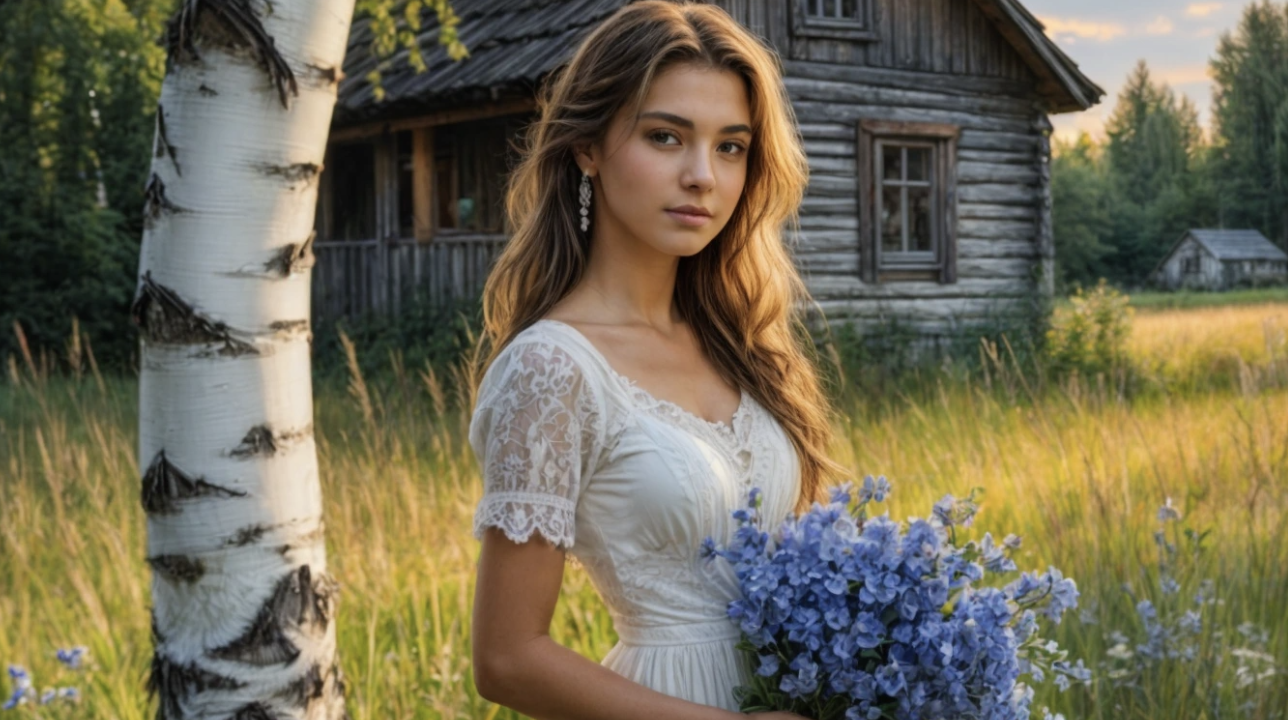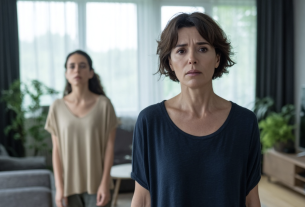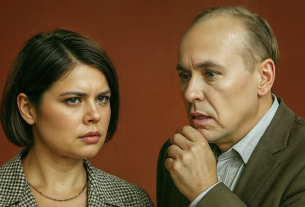Grandmother Alexandra’s house, whom the villagers simply and familiarly called Shura, was avoided by day from afar. Not that anyone saw evil or black magic in her, but among the people, as usual, they loved to believe in omens — especially in old times. Strange things were said about her, whispered behind gates, near the well, in the church crowd. Both she and her granddaughter Tonya were shunned, as if something inaccessible and incomprehensible radiated from them, as if they lived by their own, not human, laws. But as soon as the sun set behind the forest and silence fell, darkness spreading, people appeared as if from underground — not only from their own village but also from the farthest hamlets. They came to Shura secretly, by a winding path through a dense thicket that began right behind her house. Footprints remained on the ground — a beaten path, as if a road to something important, something saving.
Some came with a sick cow, others — with a husband who drank without stopping, and still others — with women’s troubles, shameful even to speak of. But miracles happened — whoever came once left with hope; the second time — the cow was already calmly grazing, the husband sat sober at home, and life, as they say, went smoothly. And no one could understand where Shura got such power, or where they even came from — the grandmother and granddaughter. One day, the village noticed that in the house that had stood abandoned for years, the windows bloomed, smoke came out of the chimneys, and footsteps were heard in the forest in the mornings.
Shura was tall, lean, slightly stooped, but with lively, piercing eyes, black as coal. On her head was a dark scarf under which gray hair was hidden. Next to her was Tonya, like spring itself, like a sunbeam on a cloudy day. A fourteen-year-old girl with a thick braid, dark eyes in which some secret flickered. Both silent, closed off, they hardly spoke with the villagers, only nodded in greeting. But everyone who met their gaze felt: these eyes see everything, even what you keep silent about. And when they left in the mornings for the forest with woven baskets in hand and returned only in the evening — that’s when rumors began. At first whispered, then louder. The women whispered by the well, behind fences, in the bathhouses. Shura was a witch, and Tonya was the witch’s granddaughter. And while people just kept their distance from the grandmother, the girl was sometimes stoned or secretly hit with sticks. But Tonya never answered, never shouted, never cried. She just looked straight in the eyes, coldly and intently, then went her own way.
The men, of course, laughed at the women’s gossip. Some waved it off, some spat, saying they had nothing better to do but wag their tongues. But even they tried to keep away, not to interfere, not to get involved. The boys also avoided Tonya, though she was a beauty, but their mothers taught them: “Don’t go near witches, you’ll bring trouble.” Only one, Yegor Shumikhin, looked at Tonya differently. He was older, considered the handsomest guy in the area, cheerful, mischievous, but also hardworking and sensible. His father, Ignat, was a strict but fair man, with a strong and sufficient household. His mother, Varvara, kind but frail, had only been able to give birth to one son, so Yegor was a desirable groom. The girls flirted with him, strutted like peacocks, but as soon as Tonya appeared in the village, he stopped looking at others. And when they grew up, he began to visit her.
In the evening, he would throw a pebble at the window, Tonya would look out.
“Black-eyed, want to go for a walk?” — he’d wink playfully and offer a small bouquet of forget-me-nots.
“Too early,” Tonya would answer sternly and shrug.
“Too early? It’s night outside.”
“It’s too early for us to walk,” she’d say, take the bouquet, press it to her chest, smile slightly, and disappear behind the curtain.
And Yegor stood under the window smiling, not understanding why. She didn’t come, but it was as if she hadn’t refused. She didn’t say a word, but his heart warmed.
One day, Galka Yermolina, who had long had her eye on Yegor, approached Tonya.
“Don’t bother him, he’s mine. If I see you near him again — I’ll cut your braid!”
Galka whispered threateningly, but her voice trembled with fear. After all, Tonya was the witch’s granddaughter. Tonya was silent, looked into her eyes. They stood like that for about two minutes — not a sound.
“It’ll be scary, but don’t be afraid,” finally said Tonya quietly but clearly. “We’ll be near, everything will end well. Then you’ll get married, move far away, where there’s lots of snow. You’ll be a stranger, but they will love you, and you will love. You’ll wear furs. You’ll bear three sons for your husband.”
And she added:
“And you will give up Yegor yourself. You won’t need him.”
Galka at first frowned, then, hearing about Yegor, stomped her foot:
“I won’t give him up! And I don’t need furs!”
Tonya said nothing. Just turned around and left.
Then the war began.
“Black-eyed, I came to say goodbye,” Yegor said, leaning on the fence of Tonya’s house. “We’ll crush the enemy in a flash, I’ll come back a hero. Maybe then you’ll love me.”
He spoke cheerfully, as if joking, but hope shone in his eyes.
“I love you even now,” Tonya answered quietly, stepping closer to the fence. Yegor’s heart froze. “Here, take this,” she handed him a bundle with a scarf and wool socks.
“I told you, I’ll be back in a flash, in a couple of months I’ll be home,” he laughed.
But Tonya seemed not to hear:
“Keep this close to your heart. It will protect you. And remember strongly: I love you and will wait.”
She handed him a small linen pouch. Yegor took it without even looking inside. His eyes couldn’t leave her face. Only one word echoed in his mind: “Love.”
“Well, it’s time,” Tonya whispered. And from the truck, her father Ignat and other men were already calling — they were leaving for the front.
Yegor ran, glancing back.
“Love?” he shouted as he ran.
“Love!” she shouted back. “Forever.”
Behind her on the porch stood Shura, not taking her black eyes off the leaving vehicle. She whispered something, unheard by everyone.
The war was long and terrible. Notices of death came often. Those who returned came broken — without a leg, without an eye, without a soul. The women began to come to Shura again. Each hoped to hear that her husband, son, or brother was alive. But Shura did not always answer. If she was silent — death awaited. If she spoke — the loved one would return. And so it happened with Ignat’s notice. Varvara, Yegor’s mother, completely broke down. Her health was weak before, now it failed entirely. One morning Tonya went out and saw Varvara at the gate. She didn’t dare enter. Tonya ran to her, took her hand, and invited her inside.
“Tell me honestly, Tonya… Will Yegor come back? Will we ever see him?” whispered Varvara, pale and thin.
“He will come back. You will wait. I will wait too,” Tonya replied, gently stroking her hand. Varvara’s face brightened a little.
But soon the Germans came to the village. They occupied huts, drank, mocked people. Only Shura’s house was avoided. Almost all men were gone: those who went to the front joined the partisans. The village was left with women and girls. One day, Galka went to the well for water, when suddenly German soldiers surrounded her. They laughed, whispered among themselves, ogled her; one already reached out to her. Galka was scared to death, heart pounding wildly, unsure how to escape. But suddenly the soldier who approached grabbed his head, screamed, and retreated. The others stepped back as well. Galka stood trembling, looking around — no one. In the distance, by the last house, behind the fence, she saw Shura with Tonya. They looked at her attentively. Tonya nodded to her and disappeared into the house. Then Galka came to her senses, quickly filled her bucket, and ran home.
Women whispered: why do the Germans seem not to notice Shura’s house? Everyone came to one conclusion — a witch. It didn’t take long before our troops arrived and drove out the enemy. Shura was thanked — it turned out she and Tonya hid several wounded fighters at home, cared for them. Without the occupiers, life became a little easier, the residents breathed easier. But Tonya disappeared somewhere. She was gone for many days. Later, a partisan said: “I was on watch. At dawn, I hear a branch snap somewhere. I look — nearby stands a girl, quiet, as if appeared from thin air. She came silently. I raised my rifle and shouted ‘Stop!’ Then Vasily ran up and said, ‘Don’t make noise, this is Tonya, the witch’s granddaughter, I recognized her. Why did you come?’ We approached, and she asked, ‘Where are your wounded? I will heal.’ And indeed — she got everyone back on their feet,” he told, scratching his chin.
The war ended. Men began to return home. But Yegor did not appear. Every time Varvara met Tonya on the street, she looked at her with hope. Tonya only nodded silently: wait, he will come back. And one evening, when it was already dark, a vehicle stopped at the gate. Varvara barely had time to throw on a scarf and ran out — the vehicle had already left, but in the twilight by the gate stood her son — Yegor. Without both legs. On a board with wheels. His face disfigured by a scar.
“My son, my dear, you have returned!” Varvara ran to him.
“Better if I hadn’t come back. Who needs me now?” Yegor replied bitterly. The war crippled not only his body but his soul. The cheerful young man was gone.
“But Tonya waited for you, she promised you’d come back. And Galya waited too,” his mother tried to cheer him.
“Look at me… What will they say now?” Yegor grimaced. All these years he kept in his heart Tonya’s image — her black eyes, the promise of love. The socks were worn out, the scarf lost, but the linen pouch was kept in his breast pocket. But why would Tonya want him now — a cripple? She’s a beauty…
The next day, the roles seemed reversed: Varvara left the house, and Tonya stood at the gate. By her mother’s face, Tonya immediately understood everything.
“Don’t wait. He doesn’t want to see me,” Varvara shrugged and went about her business. Tonya remained standing.
“Why doesn’t she leave?!” Yegor was angry inside the house. Through the window, he saw how his mother said Tonya came. His heart clenched. There she was, his Tonya — slender, beautiful. And he? A stump. Two hours passed, and Tonya was still standing. Yegor could not bear it and went out onto the porch:
“Well, now will you say you love me?!” he shouted, clenching his fists to hold back tears. He was afraid Tonya would turn and leave. But Tonya had long been waiting for this: she rushed to the porch, fell to her knees before him, kissed his hands, cried, stroked the scar on his cheek.
“I said ‘forever,’ means forever,” she whispered. Yegor could not resist — he pressed against his beloved, hid his face in her black hair, kissed the crown of her head, crying himself.
Soon Galka learned that Yegor had returned but had not come to him. She gasped, covered her mouth upon hearing he was without legs. And left. During the war, when the village was liberated, she met a young soldier from Yakutia. He loved her at first sight. After the war, he did not forget — came, invited her to live with him. At first, Galya refused, then agreed. She now sends letters, writes about snowy northern winters, sends postcards: she in a fluffy fur coat, smiling, next to three boys — narrow-eyed like their father.
Yegor and Antonina did not delay their wedding. A month later, Antonina became mistress of his house. Varvara accepted the daughter-in-law as her own. Grandmother Alexandra stayed in her house on the outskirts and lived a long time more. Antonina and Yegor had two sons, then a daughter, Liza. The boys took after their father: blue-eyed, curly-haired. And Liza was all her mother: black hair, big dark eyes. When the daughter turned one, grandmother Alexandra came to congratulate them, brought a gift, and asked Antonina to visit her with the child the next day. Tonya left with the baby in the morning, managed the household, returned by noon.
“Talk to the men, have the grave dug. Grandmother has died,” she calmly asked. Yegor was even surprised how easily she said it, without tears.
Of course, there were people who objected to burying grandmother Alexandra in the common cemetery — they remembered she was a witch. But others reminded them how many people she saved, how she helped the wounded during the war. They buried her, though somewhat aside. Although no one officially admitted it then that they turned to Alexandra for help, the path to her house in the forest never overgrew.
After her death, people came to Antonina for advice and treatment, especially those who remembered how she helped the partisans. Now she was no longer called a witch — everyone knew she was kind, responsive, and capable. They called her a healer, though in whispers. Antonina helped many people. She and Yegor lived many years in love and harmony. His hands were whole, and he worked skillfully. When the sons grew up, they moved to the city, and Liza stayed with her parents.
They say many years later, after Antonina’s death, people came from afar to her daughter Liza for help. And then — to her granddaughter… Though maybe these are just legends, just rumors.



